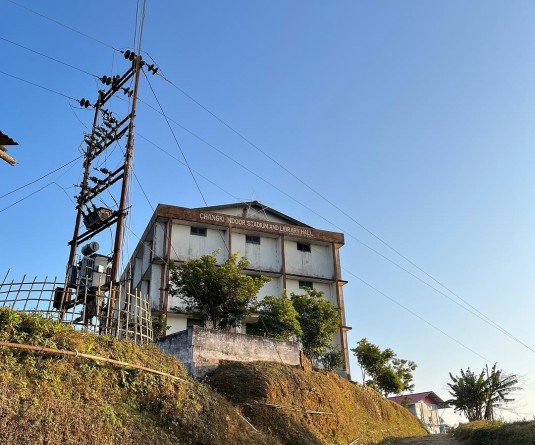
Morung Express News
Chizami | March 8
Chizami | March 8
Traditional grass rain coats and graduation hats made of leaf—14 women farmers from Nagaland and one from Meghalaya, for the first time in their lives, were honored (with the coat and hat) for their contribution to biodiverse farming during the International Women’s Day (IWD) celebrations held at the North East Network’s (NEN) resource centre in Chizami, Phek district.
These, as well as the 90 other women farmers and 33 men farmers present at the event, have not only kept genetic biodiversity alive on the farmland but also ensured health and nutrition to those many families in the region through jhum agriculture, terrace farming and family/backyard farming.
Keeping up with its tradition and commitment towards supporting marginalized communities, especially women, NEN organized a Biodiversity Festival, this year, launching the International Year of Family Farming on March 7. Since women are the primary food producers and care-givers in the context of the North East region, they have been kept central to the project—strengthening farmer solidarity in Nagaland.
This continued into the IWD 2014 on March 8 that celebrated womanhood in Nagaland through its women farmers, through the exchange of seeds and agricultural knowledge. While thanking every farmer present at today’s event, Project Team Leader, Seno Tsühah said, “We have to remember the women within our society who have contributed to social change—the mothers who made sure that their daughters were sent to schools and colleges to ensure a better future for women today.” That women need freedom from violence against them, and political and economic empowerment to be able to do so, as well as to ‘Inspire Change,’ which is the IWD theme for this year.
Women who feed societies are the enablers of this model, and were represented at today’s event from villages like Fakim, Therutsuswu, Ruzazho, Phugi, Dzulhami, Phesama, Noklak, Laitsohpliah (Meghalaya), Mesulumi, Sumi, Thetsumi, Sakraba, Enhulumi and Chizami—peripheries merging with other peripheries.
As Tsielie Sakhrie and Samhita Barooah, in their solidarity messages noted, it is only through people-to-people solidarity that positive change can be brought about in the neighborhoods and communities.
Chief Guest at the event, Menukhol John, Commissioner& Secretary, Land Resources said that respect for women and reduction of violence against women has to start from the kitchen, the home. He noted how many initiatives in Nagaland today have women at their forefront—from a microfinance unit in Tuensang to all self help groups to excelling in education. He was presented with a farmers’ declaration titled ‘an appeal to policy makers’ (see appeal in page 4).
The Day was interspersed with traditional folk dances and songs. Invocation prayer was offered by Rev. Puli from New Phor Village. Solidarity messages were given by Samhita Barooah, TISS Guwahati, Niukai Pinglang, Noklak, Khriesino Rikha, Southern Angami Women’s Organisation, Tsielie Sakhrie, Khonoma Nature Conservation & Tragopan Sanctuary.
An appeal to policy makers
We, the food producers of Nagaland, have been struggling to survive under conditions of poverty, food insecurity, erratic climate variations, shrinking land holdings and acute water scarcity. Women farmers face the first impact of these conditions, being the primary food cultivators and care-givers in Nagaland.
Our farming systems have been sustaining us since ages but in the current context of invasive technology, profit maximization and rising inequalities, we need to equip ourselves with diverse skills and knowledge systems—we need to widen the policy framework based on these.
To facilitate this through continued collaboration with the State, 90 women farmers and 33 men farmers have come together on March 7 and 8, 2014, at Chizami, Nagaland. Thus, the following points of recognition and action by Policy Makers within the Government have been collectively arrived on.
WE APPEAL FOR IMMEDIATE RECOGNITION AND ACTION ON:
1. Mandatory inclusion of women farmers and millet based agriculture workers into all technical and informative agricultural trainings, capacity building programmes and knowledge sharing sessions by the State authorities.
2. Equitable recognition of women's work in farm land, homestead land and forest land.
3. Adequate mechanization of agricultural practices to be customised for women's needs and capacities which is inclusive of traditional practices.
4. Provision of Updated Information on current context-specific agricultural innovations, agrarian markets, all season storage facilities, conservation, processing and procuring of organic and land compatible seeds.
5. Equal remuneration for equal work for all women farmers, agriculture labourers and workers.
6. Land use plan to be done with consent and collaboration from the farming community with women farmers in the leadership positions.
7. Credit and cash allowances for organic farmers. Additional incentives to elderly women farmers.
8. Promote family farming practices with women as equal partners.
9. Vulnerability reduction mechanism for single women farmers.
10. Ensure food and nutritional security through millet based farming practices.
11. Incorporation of good practices in sustainable farming into policy framework.
12. Exposure and exchange of farmers at the community level.
13. Family support services to be made accessible for farming communities.
14. Health measures for women farmers within public health flagship programmes.
15. Social security for organic farmers promoting agro-biodiversity with insurance for market risks, post harvest management, climate variations, health risks of farmers.
India, being a signatory and committed to the UN Convention of the Elimination of Discrimination Against Women (CEDAW), UN International Covenant on Economic, Social and Cultural Rights (ICESCR), Beijing World Conference on Women in 1995 and the Millennium Development Goals, it has a responsibility to cater to the urgent appeals of the farming community, especially women.
The farmers are represented by:
1. Chizami Village
2. Enhulumi Village
3. Thetsumi Village
4. Sumi Village
5. Mesulumi Village
6. Dzulhami Village
7. Phugi Village
8. Ruzazho Village
9. Therutsuswu Village
10. Fakim Village
11. New Phor Village
12. Noklak Village
13. Khonoma Village
14. Jotsoma Village
15.  ; Phesama Village
16. Sakraba Village





